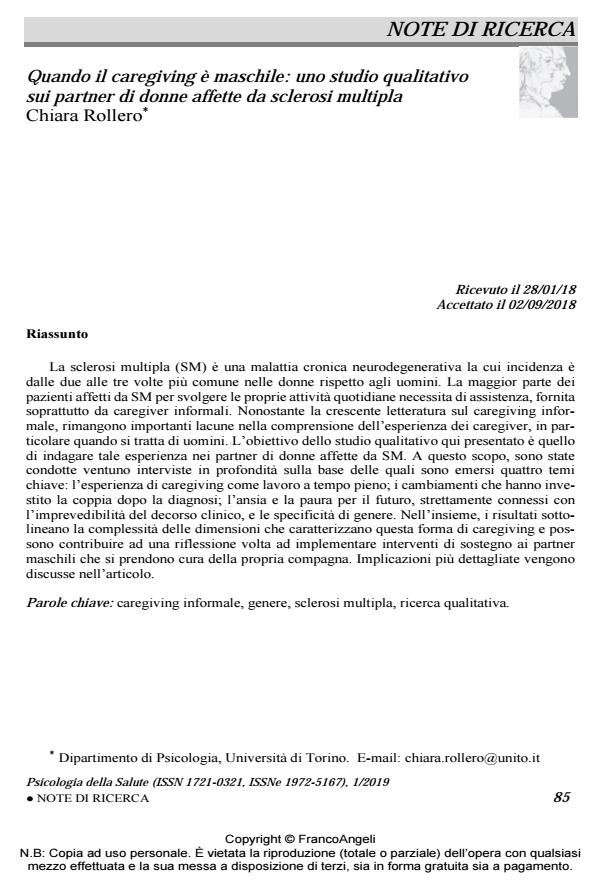When caregiving is masculine: a qualitative study with partners of women affected by multiple sclerosis
Journal title PSICOLOGIA DELLA SALUTE
Author/s Chiara Rollero
Publishing Year 2019 Issue 2019/1
Language Italian Pages 12 P. 85-96 File size 218 KB
DOI 10.3280/PDS2019-001005
DOI is like a bar code for intellectual property: to have more infomation
click here
Below, you can see the article first page
If you want to buy this article in PDF format, you can do it, following the instructions to buy download credits

FrancoAngeli is member of Publishers International Linking Association, Inc (PILA), a not-for-profit association which run the CrossRef service enabling links to and from online scholarly content.
Multiple sclerosis (MS) is a neurodegenerative disorder two to three times more common in women than in men. Most people with MS require assistance with daily activities, which is mainly offered by informal caregivers. Although the increasing literature about informal caregiving, important gaps remain in the understanding of the caregivers’ experiences, particularly those of male caregivers. The purpose of the present qualitative study was to extend past research by providing in-sight into the meaning of the experience of male caregivers living with a partner with MS. To this aim, twenty-one men were in-depth interviewed. Four key themes emerged: caregiving as a full-time job; changes within and out of the couple after the diagnosis; anxiety and fear of the future, related mainly to the unpredictability of the course of MS; gender specificities. Taken together, results highlight the complexity of issues surrounding such form of caregiving and can help in developing interventions to support male spousal caregivers to care for their partners. More specific implications are discussed.
Keywords: Informal caregiving, gender, multiple sclerosis, qualitative research.
- Do Hospitals Satisfy Our Healthcare Information Needs for Rare Diseases?: Comparison of Healthcare Information Provided by Hospitals with Information Needs of Family Caregivers Ting Wang, Brady Lund, Mirah Dow, in Health Communication /2024 pp.1628
DOI: 10.1080/10410236.2023.2228010 - The Caregiving Experiences of Fathers and Mothers of Children With Rare Diseases in Italy: Challenges and Social Support Perceptions Paola Cardinali, Laura Migliorini, Nadia Rania, in Frontiers in Psychology 1780/2019
DOI: 10.3389/fpsyg.2019.01780
Chiara Rollero, Quando il caregiving è maschile: uno studio qualitativo sui partner di donne affette da sclerosi multipla in "PSICOLOGIA DELLA SALUTE" 1/2019, pp 85-96, DOI: 10.3280/PDS2019-001005